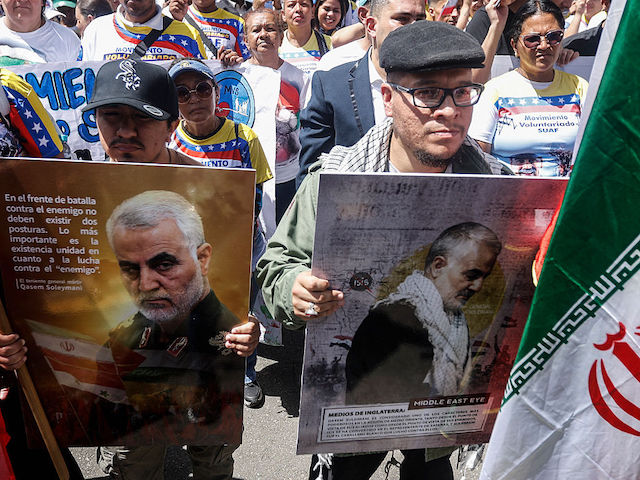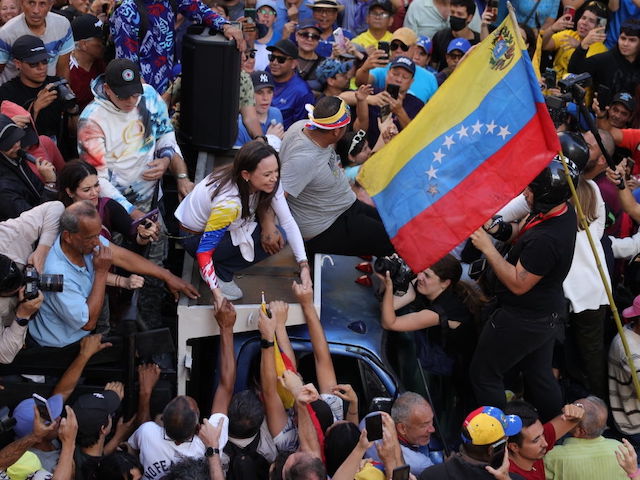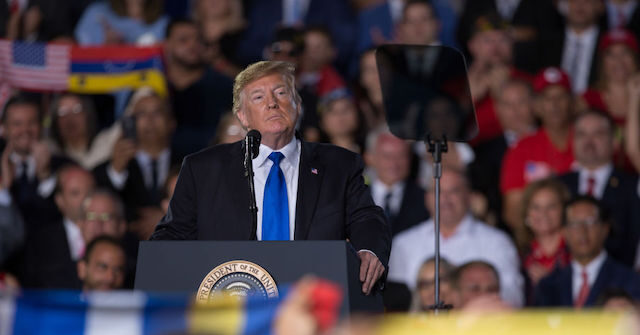President Donald Trump has placed freedom in the Western Hemisphere back on the table. In doing so, he is pointing to a reality that could transform Latin America and strengthen the United States: a free Venezuela, governed by a legitimate democratic leadership, aligned as Washington’s strongest ally.
For decades, Venezuela was the richest country in Latin America and a solid partner to the free world in trade, human rights, and keeping the global order. America has much to gain from supporting the country being restored to the hands of a popularly supported government, rather than the narco-terrorist allies of Iran and China who reign today. President Trump’s campaign against drug trafficking in the Caribbean – which directly benefits the Maduro regime, as well as nefarious actors such as Hezbollah and the Revolutionary Armed Forces of Colombia (FARC) – is tipping the scales in favor of the Venezuelan people.
Prior to socialism, Venezuela prospered thanks to its vast oil reserves — the largest proven crude reserves in the world — a privileged location in the Caribbean, and a highly educated population. But Chavismo’s so-called “21st-century socialism,” implemented by Hugo Chávez and later Nicolás Maduro, devastated the country. Under this model, the state expropriated private industries, imposed strict currency and price controls, politicized the military, and used oil revenues to buy political loyalty instead of investing in infrastructure or development. The result was catastrophic: a collapsed economy, more than 8 million people forced to migrate, and nearly 86% of those who stayed plunged into poverty.
Venezuela’s Presidential Honor Guard members walk past a mural with images of former President Hugo Chávez on August 30, 2025. (Photo by Pedro MATTEY / AFP)
The Maduro regime poses a grave threat to U.S. national security, far beyond Venezuela’s economic collapse. The “Cartel of the Suns,” a network of corrupt Venezuelan military officials, facilitates the transit of approximately 24 percent of the global cocaine supply through Venezuela en route to U.S., European, and African markets, according to DEA estimates from 2020. Meanwhile, the Tren de Aragua, Venezuela’s most powerful transnational criminal organization, has expanded into at least 12 countries across the Americas, exporting violence and destabilizing the region.
Venezuela has also become a safe haven for U.S. adversaries, including Hezbollah operatives and Wagner mercenaries — the Russian paramilitary force that has operated in Ukraine, Africa, and the Middle East — now present in Venezuelan territory just a short distance from U.S. shores. This proximity turns Venezuela’s collapse from a regional tragedy into a pressing security concern for Washington.

Two men hold posters with the image of the late Iranian terror mastermind Qasem Soleimani at the Iranian embassy in Caracas on June 17, 2025. (Photo by Pedro MATTEY / AFP)
Venezuelans have, for years, aggressively rejected this situation, and have consolidated behind an opposition leader. María Corina Machado, the 2025 Nobel Peace Prize winner, backed by more than 70 percent of Venezuelans in the last election, stolen by the regime, achieved this support despite the fact that roughly 8 million Venezuelans living abroad — overwhelmingly anti-regime — were prevented from voting, and despite widespread electoral manipulation, pressures, and repression inside the country. In a fully free and fair election, her backing would likely approach 90 percent.

09 January 2025, Venezuela, Caracas: Venezuelan opposition leader Maria Corina Machado leading a demonstration against the re-inauguration of authoritarian President Maduro. (Photo by Jesus Vargas/picture alliance via Getty Images)
Machado is the first Venezuelan opposition leader since the rise of Chavismo who openly embraces free-market principles, capitalism, and Western values, aligning herself with the region’s right-wing leaders.
Her support for President Trump and his policies is unmistakable. On August 12, she wrote a letter thanking him for his efforts in the Caribbean to dismantle Nicolás Maduro’s narco-terrorist regime.
Additionally, after being honored with the Nobel Peace Prize, in her first message, she dedicated the award to the Venezuelan people and also to President Donald Trump for his support of Venezuela’s fight for freedom.
While President Trump hasn’t publicly called for toppling Maduro’s illegitimate regime, military actions in the Caribbean and recent reports suggest Washington has concluded that the only way to slam the brakes on the flood of drugs, crime, and terrorism into the U.S. is by finally dismantling Latin America’s biggest criminal network: the Maduro regime, along with all the criminal groups operating under its umbrella: the Cartel of the Suns, the Tren de Aragua, and even Colombian paramilitary guerrillas like the FARC and the National Liberation Army (ELN), which have been thriving in Venezuela for years.
In that sense, the Caribbean operations have triggered some fretting that Venezuela could become “another Haiti” or “another Middle East.” But these comparisons ignore reality.
Unlike Haiti, Venezuela built one of the most stable democratic systems in Latin America from the mid-20th century onward. For four decades, the country held competitive elections, alternated governments peacefully, and developed strong institutions that, although hijacked by Chavismo, remain deeply rooted in the national identity. Venezuelans are also among the region’s most educated populations, with a vibrant culture of civic engagement grounded in Catholic values and strong family ties.
This strength is visible even in the United States: 55 percent of Venezuelan adults in the U.S. hold at least a bachelor’s degree, compared to 37.9 percent of all Americans and only about 20 percent of other Hispanics. In fact, according to the Pew Research Center, 19 percent of Venezuelans in the U.S. have postgraduate degrees — the highest share of any Latino immigrant group, nearly triple the Latino average of seven percent and above the U.S. non-Hispanic average of 14 percent.
And unlike Iraq or Afghanistan, Venezuela is not divided by centuries of sectarian, religious, or ethnic conflict. Even under a brutal regime, Venezuelans have consistently chosen ballots over bullets, pressing for electoral solutions even as Chavismo shut down democratic paths.
Venezuela’s path to freedom perfectly aligns with America’s strategic needs. The U.S. needs stable allies, reliable energy, and open markets. Venezuela needs investment, technology, and the protection of liberty.
President Trump gets it. He grasps not just the geopolitical landscape but also the pulse of Hispanic communities across the United States. At a press conference, he acknowledged that an impressive 92 percent of Venezuelan-Americans supported him in the last presidential election. Together with Cubans and Nicaraguans, Venezuelan voters have formed a formidable bloc, united in their view of Trump as the steadfast leader opposing socialism throughout the hemisphere.
President Trump’s Caribbean operations have sent a very clear message to the leaders of the narco-terrorist cartel that has hijacked Venezuela: There will be no more diplomatic channels or concessions. They must relinquish power, or we will soon enter a new phase of military strikes against the leaders of terrorism in the Americas — actions that, by the way, are supported by three-quarters of the Venezuelan population, according to a Panterra survey.
With María Corina Machado at the helm, and with President Trump’s willingness to back Venezuela’s liberation, the country is ready to become America’s strongest ally in the Western Hemisphere: an alliance built on freedom, prosperity, and shared destiny.
Emmanuel Rincon is a lawyer, political consultant, and writer. Winner of various literary awards and author of the essay books Westernism, Man Playing God, and The Ideological Reinvention of Latin America, among other works. He is the founder of the consulting agency Regional Renaissance.
Read the full article here
